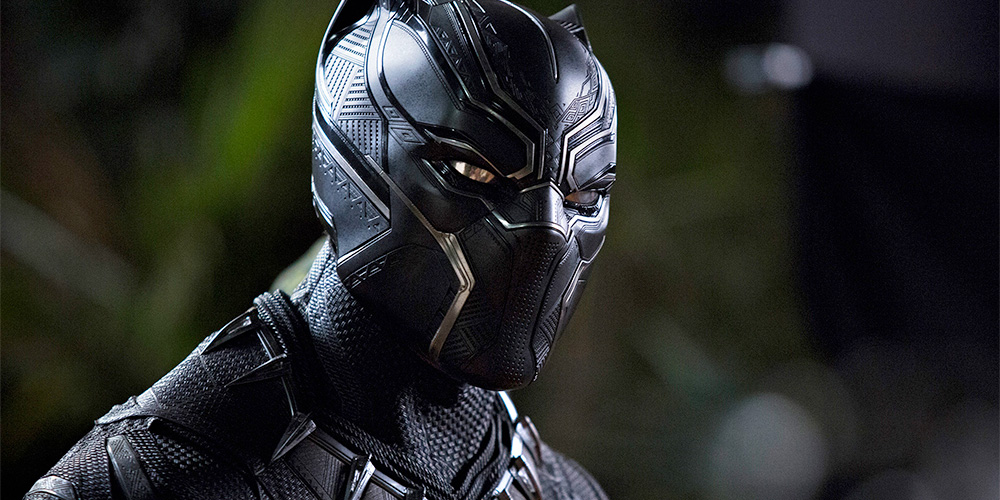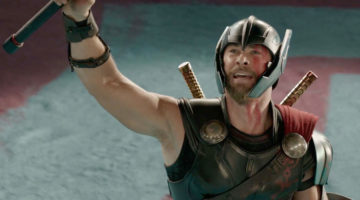Review: Black Panther
For the first time, the Marvel Cinematic Universe is about something.
The age of the Marvel Cinematic Universe has been a bright one. Year after year we’ve seen our favourite heroes come to life on screen, and for a time that was enough. Costume reveals, post credit scenes, trailer countdowns – to put it lightly, it all became quite trivial. Since the 80s, the blockbuster has been redefined many times. As audiences evolved as filmgoers, filmmakers evolved as storytellers and brought us richer stories using the monumental budgets. These stories spoke to us as humans, which shone past the commercial value of a leading lady or mind blowing effects.
That moment of evolution has come for the comic book genre in the form of Ryan Coogler’s Black Panther.
As we come into the film and catch our bearings, we find ourselves days after the events of Captain America: Civil War. T’challa (Chadwick Boseman) has come home to bury his father and take the throne as the new king of Wakanda and become the next Black Panther, protector of the people of Wakanda. T’challa’s hope is that he can grow to be a great king like his father once was and continue the Wakandan’s quiet but prosperous way of life, in hiding. Coming home to his loving family (Angela Bassett as Ramonda and Letitia Wright as Shuri), guard Okoye(Danai Gurira), and ex Nakia (Lupita Nyong’o), many seem to support this passing of the torch, but there have been conversations on the side that suggest that T’Challa might not be up to the task at hand. As T’Challa tries to settle into his role as king, Ulysses Klaue (Andy Serkis) is doing the bad guy thing and hunting down Vibranium, a special type of indestructible metal that is used and kept hidden by the Wakandan people. Klaue is not alone in his search, teaming up with a mysterious but intelligent stranger (Michael B. Jordan) who seems to know a lot about Wakandian history. Their search has brought them all around the world, but both of their eyes are on the motherload, Wakanda, and with danger on his doorstep T’Challa is about to learn the complexities that come with protecting a nation.
While the setup feels familiar, the execution is anything but. Ryan Coogler and his team have constructed a layered and exciting story that thematically explores tradition, family, and responsibility. It’s also dripping with references to Black history, and current social-political commentary which we’ll dive into later. Coogler isn’t new to directing films in established franchises, with his last release Creed bringing unrealized life back to the Rocky franchise. They say lightning doesn’t strike twice, but maybe with Coogler it has as he has done the same with the MCU. The game has changed for what a superhero movie can be.
On a technical level Black Panther is a different beast entirely, but a beautiful one at that. Wakanda is brought to life through vibrant palettes and expert use of colour. Tones set the mood and enrich the thematic elements of scenes. This is taken one step further with the cinematography which uses strong composition to set it the stage for entire acts and moments in the film. The imagery is rich and thought provoking, captivating both mind and spirit. However, like all great film, the script is where this film truly shines. Joe Robert Cole and Ryan Coogler understand the material they are dealing with, and furthermore they understand the impact of this material. The stories of Wakanda speak to a large audience of boys and girls that lacked representation, and on a worldwide scale it brings hope and pride. This isn’t about seeing your favourite hero blow stuff up. It’s an echo to Malcolm X and MLK. It’s a testament to the struggle of an entire race. It’s a statement. Black Panther is about something and it doesn’t shy away from this, it embraces it.
The ensemble cast led by Coogler deliver a thoroughly entertaining performance. The film isn’t about large performances, but the cast works so well together that as a whole they are something else entirely. While Boseman handles T’Challa’s calm and collected demeanor, certain scenes are able to display the range he has. The same can be said for Lupita’s portrayal of Nakia. The real standouts from our group are Michael B. Jordan and Letita Wright. Jordan is a force, carrying the pain of nation on his back while sporting some of the impressive prosthetic work. Wright’s portrayal of Shuri, T’Challa’s intelligent and wise cracking sister is show stealing. She’s bright, charismatic, but never over the top making her believable. You’ll wish Shuri could be your best friend in real life, or at least that you could follow her on Twitter. Also, a shoutout goes to Danai Gurira as she embodied something so badass that she stole the light from Black Panther at times. You might have some for the suit but you’ll leave wanting more Okoye action scenes.
A quick note on the soundtrack which holds a beautiful spiritual energy that isn’t quite aggressive as it is uplifting and soul shaking. A nod to tradition and a nod to the future is how the music is handled, settling us into the rhythm driven sounds of Wakanda before moving into South Korean hip hop for an exciting action scene. It all comes together to form an energy that feels unique to the film itself.
Everything in Black Panther comes together to add to this energy. This is a cohesive vision that works on many levels. For the first time a Marvel film has really questioned what the hero means to the fan base and developed from there, and the film is so much richer because of it. Everything down to the post credit scene is dripping with a message, and for the first time the audience will walk out with ideas, and not just visual sustenance. For the first time, the Marvel Cinematic Universe is about something.




